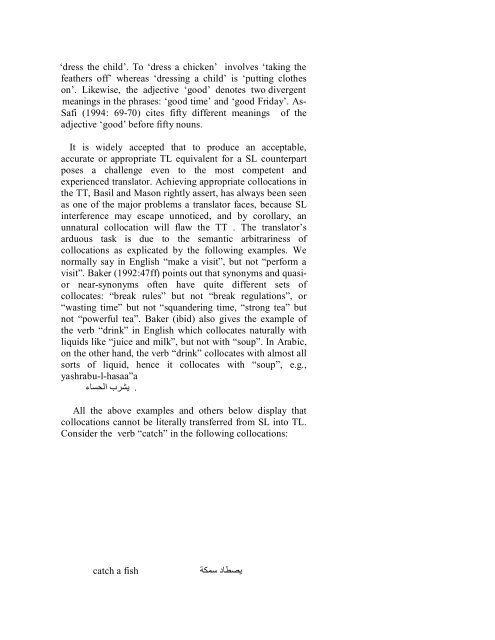424_2061_A.B.
424_2061_A.B.
424_2061_A.B.
- No tags were found...
Create successful ePaper yourself
Turn your PDF publications into a flip-book with our unique Google optimized e-Paper software.
‘dress the child’. To ‘dress a chicken’ involves ‘taking thefeathers off’ whereas ‘dressing a child’ is ‘putting clotheson’. Likewise, the adjective ‘good’ denotes two divergentmeanings in the phrases: ‘good time’ and ‘good Friday’. As-Safi (1994: 69-70) cites fifty different meanings of theadjective ‘good’ before fifty nouns.It is widely accepted that to produce an acceptable,accurate or appropriate TL equivalent for a SL counterpartposes a challenge even to the most competent andexperienced translator. Achieving appropriate collocations inthe TT, Basil and Mason rightly assert, has always been seenas one of the major problems a translator faces, because SLinterference may escape unnoticed, and by corollary, anunnatural collocation will flaw the TT . The translator’sarduous task is due to the semantic arbitrariness ofcollocations as explicated by the following examples. Wenormally say in English “make a visit”, but not “perform avisit”. Baker (1992:47ff) points out that synonyms and quasiornear-synonyms often have quite different sets ofcollocates: “break rules” but not “break regulations”, or“wasting time” but not “squandering time, “strong tea” butnot “powerful tea”. Baker (ibid) also gives the example ofthe verb “drink” in English which collocates naturally withliquids like “juice and milk”, but not with “soup”. In Arabic,on the other hand, the verb “drink” collocates with almost allsorts of liquid, hence it collocates with “soup”, e.g.,yashrabu-l-hasaa”a .All the above examples and others below display thatcollocations cannot be literally transferred from SL into TL.Consider the verb “catch” in the following collocations:catch a fish71
















